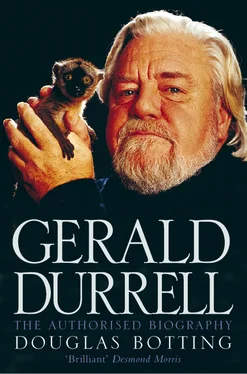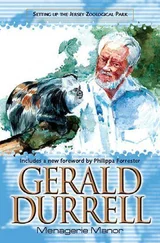Victoria was merely a curtain-raiser to the real show, and ‘small beef’ were small beer compared to the ‘big, big beef’ they hoped to find in the wild interior. Much of the first week was spent sorting themselves out and stocking up with supplies for the six months of adventures that lay ahead. Their immediate plan was to drive two hundred miles to the small up-country town of Mamfe, which would be their springboard to the wilder country of the primeval rainforest that stretched all around.
On Monday, 5 January 1948, they finally set off in a manner to which they were soon to become accustomed. For a start, the lorry turned up four hours late and turned out to be crowded with the driver’s relatives, whom Gerald had to clear out, along with their household goods and livestock. The driver himself did not inspire much confidence, for as he was turning the lorry for loading he twice backed into the rest house wall and once into the hibiscus hedge. The expedition’s baggage was tossed into the back with such wild abandon that Gerald wondered if any of it would arrive intact in Mamfe. ‘I need not have worried,’ he noted later. ‘It turned out that only the most indispensable and irreplaceable things got broken.’ The name of the lorry – ‘The Godspeed’ – was painted in large white letters above the windscreen. ‘It was not until later,’ Gerald was to write, ‘that we discovered what a euphemism the name really was.’
So the great adventure began. Gerald’s letters to Mother (never published before) provide a raw and spontaneous day-by-day account of its gradual unfolding.
Eventually we were ready to start, and John and I got in the front, and sat there looking as regal as circumstances would let us. We whizzed out of Victoria and had got about five miles down the road, the lorry making a most impressive roaring noise, when there was a terrific gurk and the engine stopped. We got out of the lorry, and while the driver, with the rest of the staff, probed into the bowels of the engine, Pious (the steward) put cushions at the side of the road, poured out beer, and fanned the flies away from our recumbent forms. After half an hour everything was ready, and once again we set off, tearing madly along at about 15 m.p.h. Ten miles further on the damn thing broke down again, and the same process was repeated. Before we reached Kumba (the place where we had arranged to spend the night) we had broken down four times.
About ten miles out of Victoria the palm nut plantations gave place to forest proper, and John and I just sat with our mouths open, in a sort of daze. You have no idea how beautiful it was: giant trees, hundreds of feet high, leaned over the road, each one festooned with tree ferns, long strands of grey moss, and lianas as thick as my body. On the solitary telegraph wire sat lots of kingfishers, each no bigger than a sparrow, orange and blue in colour. In the trees flocks of hornbills were feeding, and on the rocks along the sides of the road there were lots of a very beautiful kind of lizard, with orange head, bright Prussian blue body and tail, and splashed with red and yellow and grass-green all over. They are unbelievably bright in the sun. Once there was a great shout from the back of the lorry and we pulled up quickly under the impression that the cook had fallen out and been killed. It turned out they had seen a Nile monitor (a lizard about three feet long – John thought nearer to four feet) by the side of the road. We all rushed back and spread out in a circle. We closed in on it and it made a dash at the driver, who, thinking that discretion was the better part of valour, ran like hell. The last we saw of it was a tail going into the bush.
The country is very hilly, and all thickly forested. Each hill we went up we had to put up with the frightful noise made by the driver with his gear box. Every time we came down the other side we had to cross a river in a deep ravine, spanned by what John calls a ‘death trap’ – four planks with a few rotten beams, no railings or anything pansy like that. After about the fourth we got quite used to them and we could open our eyes a bit.
At around five o’clock, much to their surprise, they reached Kumba, where they stayed the night at the house of the local medic – ‘a charming fat little Scotsman and a keen ornithologist’ – who had assembled a prodigious collection of bird skins. At dawn they were off again for another day of death traps and breakdowns, arriving in the late afternoon at a place called Bakebe, where they were to stay for three days till the rest house at Mamfe became free.
It was wonderful at Bakebe because we were right in the heart of the forest. I engaged a hunter the next day, and two boys, and armed with a shotgun sallied into the jungle, à la Frank Buck. In the depths of the forest itself there is a sort of green twilight, with huge termite nests, each built like a mushroom, and an extraordinary white butterfly which flits among the trees like a whisp of white lace. In the sunny clearings there were many other sorts of insect life, including some black ants an inch and a half long. Unfortunately they discovered me before I saw them, and it was very painful. I was dancing around while the hunters were plucking the ants off, all saying ‘Sorry Sah’ loudly, as though they had put them there. When you trip over a root you hear about three voices behind you saying ‘Sorry Sah.’ We saw several monkeys feeding in the trees, and tracks of Duikers, small rats, and Leopard. Then we discovered the tracks of a Red River hog and followed them up. We walked for about four miles and stumbled right into a herd of them. One baby broke only about twenty feet from me.
The collecting business now began to gather momentum. The next day Gerald went back into the forest, and among other things caught a creature that in the fullness of time and in the most indirect way was to prove pivotal to his future career. This was the hairy frog – ‘a large frog,’ he explained in his letter home, ‘with curious filaments like hairs on its legs and the sides of its body.’ But most of the growing list of animal acquisitions were caught or donated by others. The United Africa Company agent at Bakebe presented his pet dog-faced baboon, the doctor at Kumba sent two baby giant kingfishers, a DO who lived a hundred miles out in the sticks proposed giving them his three-year-old chimpanzee, a local boy brought in ‘a lovely rat with red fur and a yellow tummy’, and a man from a nearby village turned up dragging along a baby drill (today one of the most endangered monkey species in Africa) on a bit of string.
The Drill is the sweetest little thing, standing about a foot high. He is very young, and the pink patches on his behind only the size of a shilling. He was very wild the first day, but is quite tame now, and when I return from a trip into the forest he comes running to meet me, uttering loud screams, and climbs up my leg and then wraps his arms round my waist and clings there making little crooning noises. I am sure I shall not want to part with him when the time comes.
There is no doubt that Gerald loved the country he had come to. He was held in thrall by the stillness and grandeur of the primeval forest, and adored the birds he saw flying free and the animals running wild no less than the curious assortment of creatures that came into his care. But it is clear from his letters and field notes that the Gerald Durrell of up-country Cameroons in 1948 was not yet the Gerald Durrell the world was to come to know in later years; and in one important respect the unreformed twenty-three-year-old might have dumbfounded his future fans. The young man of 1948, though he dearly loved animals, was fully prepared to slaughter them if there was a good enough reason to do so. He had brought to the Cameroons a rifle and a shotgun he had borrowed from his brother Leslie, and he knew how to use these weapons and was prepared to do so. Partly this was standard practice. No self-respecting expedition to the African interior in those days would have dreamed of setting off without guns of some sort – to shoot game to supplement their rations and feed the carnivores they collected. But the young Gerald Durrell sometimes succumbed to the hunting instinct in a way that would have dismayed the man of later years.
Читать дальше










